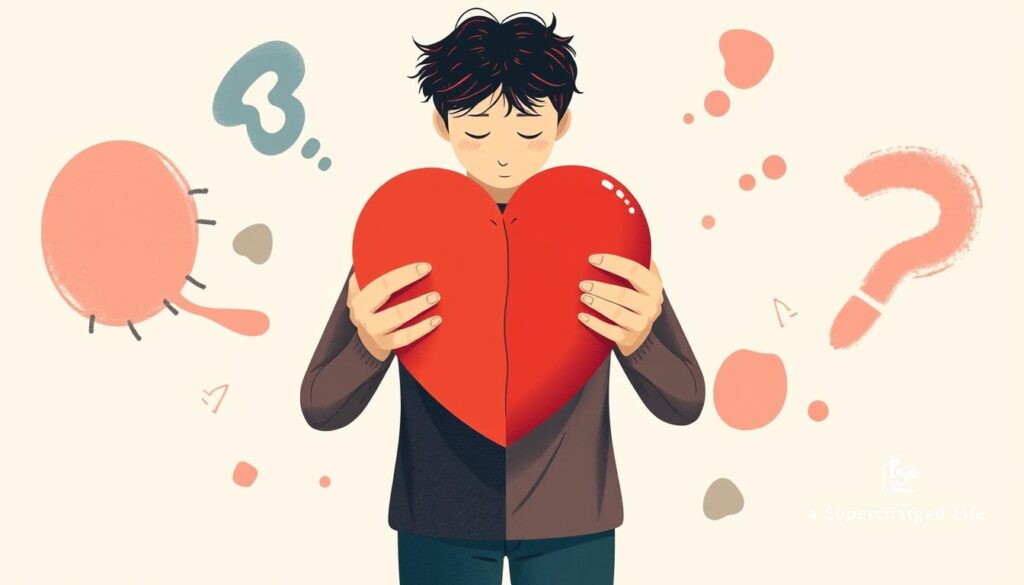Ever feel like you’re pouring your heart into a relationship, but it’s one-sided? Recognizing a one-sided relationship can be tough. It drains your energy and makes you doubt your worth.
When one person gives more than the other, it’s bad for both. People in one-sided love often feel tired and lonely. This is because they don’t get the same effort back12. This article will show you 15 signs to see if your relationship is balanced or not.
Key Takeaways
- One-sided relationships involve unequal emotional, physical, or mental investment.
- Lack of reciprocity can lead to feelings of exhaustion and neglect.
- Recognizing unhealthy patterns is crucial for emotional well-being.
- Many stay in these relationships due to fear of change and shared history.
- Setting boundaries can transform dynamics, though initial reactions may be resistant.
Listen To Understanding One-Sided Relationships Podcast…
One-sided relationships can make things feel very unbalanced. One person might put in a lot more effort than the other. This can make the more involved person feel really overwhelmed3.
These relationships often lack a deep connection. It might feel like living with a roommate instead of a partner. This can make both people feel unhappy and alone3.
When one person always starts conversations or plans things, it shows an imbalance. This imbalance can affect how much each person feels emotionally invested4.
Being in a one-sided relationship can also hurt your mental health. Feeling drained from always giving without getting anything back can cause stress and anxiety4.
When one person always has to meet the other’s needs, it can lead to unequal commitment. This is called being “asymmetrically committed”5. Not getting support from your partner can make you feel emotionally drained5.
Signs of a One-Sided Relationship
It’s hard to know if a relationship is one-sided. Especially when one person does all the emotional work. Feeling tired after talking to your partner is a big sign.
The Relationship Makes You Feel Exhausted
I often feel drained because I do more in the relationship. Relationship Coach Julie Nguyen says one-sided relationships are unbalanced. This can make you feel overwhelmed6.
This imbalance can make you feel anxious and guilty. It shows how hard these relationships can be on your mind7.
Lack of Reciprocity in Emotional Support
Not getting emotional support back is a big warning sign. If I try to help but get nothing in return, it’s a problem6. Feeling ignored can make you angry and frustrated8.
Feeling Alone in a Relationship
Being in a relationship where I often feel alone is very troubling. It’s not just about being together physically. The emotional gap grows, making me feel very lonely.
My partner might be right next to me but feel far away emotionally. This has led to a new kind of loneliness. It’s about feeling disconnected and lacking emotional support in our relationship9.
This lack of emotional connection makes me feel ignored. Even though my partner is close, I feel very alone. This feeling of isolation is hard to deal with.
Physical Presence with Emotional Absence
My partner might be in the same room, but we feel far apart emotionally. This is called Ambiguous Loss. It’s when loved ones are there but not really with us9.
Talking becomes hard because I feel invisible. I start to wonder if our talks matter at all.
Not Being Emotionally Seen
When my feelings are ignored, I feel like I’m in a one-sided friendship. I’m always the one to start conversations, but my partner doesn’t always join in10.
This lack of balance can show in many ways. My partner might ignore my concerns or not want to talk about problems. I end up explaining their actions to others, which adds stress10.
| Signs of Emotional Absence | Possible Impacts |
|---|---|
| Ignoring concerns raised | Leads to feelings of neglect |
| Regularly initiating contact | Creates a sense of imbalance |
| Feeling unheard during conversations | Heightens feelings of isolation |
| Lack of shared goals and aspirations | Contributes to relationship disintegration |
In summary, feeling isolated in a relationship often comes from a big emotional gap. Even when we’re together, we can feel far apart. These signs are important to notice and deal with910.
The Imbalance in Effort
In a good relationship, both people should help out equally. This helps them feel close and united. But, if one person does more work, like planning dates or solving problems, it shows an imbalance in relationship. This can make the other person feel unimportant and unhappy.
Unequal Contributions in Time and Energy
One-sided relationships often lack balance. For example, one person might always plan things or pay for them. The other might not help much or even care. Experts say this makes people feel unfair and like they’re missing out on connection11.
Seeing these differences makes me think about how we can grow together. It’s hard to move forward when things aren’t even.
When Only One Person Initiates Contact
In some relationships, one person talks more than the other. This can make the talkative person feel like they’re carrying the relationship. Studies show that some relationships have a ‘demand-withdrawal’ pattern12. This means one person wants things to change, but the other doesn’t want to talk about it.
Communicating About Relationship Issues
Talking well is key in any relationship. But, often, one person talks more than the other. This is seen in the pursuer vs. withdrawer pattern. The pursuer wants to connect, while the withdrawer avoids tough talks, waiting for problems to solve themselves.
This imbalance can make one feel resentful and disconnected emotionally.
One-Sided Conversations
In some relationships, talks are one-sided. One person talks a lot, sharing their feelings and worries. The other might not care or listen well. This can make the talker feel ignored and stressed.
It’s important to notice this imbalance. It shows that talking is not working well, leading to bigger problems in the relationship13.
The Pursuer vs. Withdrawer Dynamic
This pattern can make one feel anxious and guilty. The pursuer feels they must solve all problems14. If one always starts talks and tries to fix issues, they might feel unappreciated.
The emotional load can be too much if the other doesn’t want to talk or share goals13. This can make the relationship feel stuck and unhappy14
| Dynamic | Pursuer | Withdrawer |
|---|---|---|
| Communication Style | Initiates discussions, seeks resolution | Avoids conversations, feels defensive |
| Emotional Investment | Feels overburdened with emotional labor | Shows little emotional support, often disengaged |
| Relationship Growth | Focuses on developing shared goals | Resists change or shared objectives |
| Common Feelings | Resentment and frustration | Anxiety and avoidance |
Knowing if you’re a pursuer or withdrawer is key. It helps create a space for real talks. This can bring balance and happiness to the relationship1314.
Dealing with Negative Emotions
Handling negative emotions in relationships can be tough. It’s especially hard in one-sided relationships. I often feel guilty and ashamed, which makes me feel bad about myself.
When one person gives more time, energy, or emotional support, it creates an imbalance. This imbalance can cause a lot of distress.
Overwhelming Guilt and Shame
In these tough situations, I feel guilty because I feel inadequate and unseen. I might say sorry a lot after fights, even if I’m right. Experts say apologizing too much is a sign of a bad relationship15.
This pattern makes me feel insecure. I might feel like I have to keep the peace, which stops us from talking things through.
Frequent Apologies Without Resolution
My apologies don’t always fix things. The power imbalance is clear, as my partner might not change or listen. This makes me feel like I’m to blame for my feelings16.
When negative feelings are more common than positive, it shows deep problems. We need to work on these issues to find a better balance.

Understanding these issues helps me face my guilt and shame. Knowing my feelings are valid is the first step to change. It’s about breaking free from bad patterns and finding happiness and balance.
The Danger of Making Excuses
In one-sided relationships, making excuses for a partner’s bad behavior is risky. I often try to justify their actions out of fear or hope for change. People in these situations might act like kids, not taking responsibility for their actions17.
They might say they don’t know how to show love or that past traumas make them vulnerable. They might also say they’re too insecure to be intimate17. These excuses lead to more emotional pain and stop personal growth.
Justifying Their Negative Behavior
When conflicts arise, many partners exaggerate their good traits and blame the other. This leads to one person justifying bad behavior instead of facing the real issues18. For example, Maria kept making excuses for Jose’s lack of effort, hoping he’d change. But this only made their relationship more unbalanced, leaving Maria tired from always giving more.
Seeing Potential Instead of Reality
Believing in a partner’s potential can keep us in unhappy relationships. I remember Giselle’s frustration with waiting for Dave to change. This thinking ignores the real problems like imbalance and emotional distance17.
Healthy relationships need effort, time, and focus. Without these, the relationship can become toxic, harming our emotional health18.
Insecurity in the Relationship
In many cases, insecurity can make a one-sided relationship tough. It makes me wonder if I’m worth it in the partnership. I often feel like my efforts are unseen and unappreciated.
Stats show that 55% of people do all the work to keep things going. Yet, 70% say their partners put themselves first19. This imbalance can make me doubt myself and feel insecure.
Questioning Your Worth
I’ve seen how insecurity makes us seek constant validation. Fear of being rejected and low self-confidence can make us too hard on ourselves. We start to doubt our partner’s true feelings, making us feel even worse20.
Experts say those with low self-confidence often doubt they deserve love. This can lead to unhealthy patterns in our relationships. We might check up on our partner a lot or need constant reassurance about our bond.
Feeling Inadequate and Invisible
In a one-sided relationship, I often feel like I’m just there out of obligation. Reports show 40% of people feel like they’re just a burden. And 45% say their partners avoid talking about relationship problems, making us feel even more alone19.
When our emotional needs aren’t met, it’s hard to say what we need. This can make us feel invisible and inadequate. Recognizing these feelings is key to building better relationships, even when past experiences are tough.
| Aspect | Impact on Relationship | Percentage Affected |
|---|---|---|
| Self-Doubt | Leads to questioning worth | 55% |
| Validation Needs | Demands constant reassurance | 70% |
| Obligation Feelings | Creates resentment and distance | 40% |
| Avoidance of Discussion | Increases feelings of invisibility | 45% |
| Emotional Support Deficit | Undermines relationship foundations | 60% |
Exploring these insecurities is crucial. We need to find ways to improve, like talking openly, understanding attachment issues, and reflecting on ourselves. Healing and growth come from facing these issues head-on, aiming for a more balanced partnership192021.
Setting Boundaries and Their Reactions
Setting healthy boundaries is key to balanced relationships. It builds respect and understanding. For many, especially in one-sided relationships, setting boundaries can lead to resistance.
Dr. Racine R. Henry, a marriage and family therapist, says boundaries are about respect. They set limits on unwanted behaviors22. This resistance shows they don’t respect my needs, making boundaries crucial for my emotional health.
Resistance to Healthy Boundaries
Setting boundaries can lead to pushback. This is common when someone doesn’t respect my space or wishes23. Dr. Henry notes that setting and keeping boundaries is hard22.
The pushback I face shows they don’t respect my limits. It also shows how important it is for me to stand by my boundaries.
Understanding the Importance of Boundaries
Knowing why a boundary is set is key. Dr. Henry says understanding the reason helps keep boundaries strong, even when faced with opposition22. I can say things like “I need space” to make my needs clear23.
Setting boundaries can be tough and make me feel guilty or empathetic. But, boundaries are vital for healthy relationships. A recent tweet on boundaries got almost 390K views24. This shows many people see how important boundaries are.

| Boundary Type | Description | Examples |
|---|---|---|
| Emotional | Avoiding situations that cause distress | Requesting a pause in a heated discussion |
| Physical | Maintaining personal physical space | Asking someone to stop unwanted touching |
| Time | Protecting personal time and energy | Declining invitations that feel overwhelming |
Why Do People Stay In One-Sided Relationships?
People stay in unbalanced relationships for many reasons. They hope their relationship will get better. They also hold onto deep emotional connections and memories.
Investing in Hope for Change
Many underestimate how much they emotionally invest. They stay hoping things will get better. This hope can make them ignore signs of imbalance.
They fear losing the connection. This fear keeps them waiting for change that might never come. Emotional immaturity and low self-esteem also play a part.
Shared experiences create a strong bond. Remembering good times can make me overlook current problems. Past memories act as a strong anchor.
This attachment makes it hard to move on. It’s important to align my emotional needs with realistic expectations. Ignoring my partner’s neglected dreams can also be a problem.
| Factors | Impact on Relationship |
|---|---|
| Emotional Dependence | Leads to a reluctance to leave despite dissatisfaction |
| Hope for Change | Encourages staying in the relationship |
| Shared Histories | Creates emotional ties that are hard to break |
| Lack of Reciprocity | Generates feelings of insecurity and questioning of self-worth |
| Unmet Emotional Needs | Results in negative emotions and avoidance of confrontation |
Can You Change a One-Sided Relationship?
Understanding one-sided relationships can be hard. Wanting to change someone’s traits is not always possible. In fact, 85% of people in these situations feel very tired3.
Talking openly is a big step towards making things better. It helps both sides work together and understand each other better.
The Realities of Changing Another Person
Changing someone’s basic traits is tough. People’s learned behaviors and life situations play big roles in relationships. This makes it hard for 63% to feel seen and valued3.
Feeling ignored can hurt our health. 56% say they get sick more often, like headaches or trouble sleeping3.
Steps to Open Communication
To make one-sided relationships better, follow these steps:
- Ask for feedback to understand each other better.
- Make a safe space for honest feelings without fear.
- Talk about needed changes, making sure both feel heard.
- Watch out for patterns where one person tries hard while the other pulls back25.
- Check if effort is balanced and talk about it openly.
These actions can lead to a better relationship. Feeling resentful is common, but talking openly can help fix that. 78% feel frustrated by unfair workloads3.
Conclusion
It’s key to know when a relationship is one-sided for my own good. Many people are always the ones to start things, talk, and solve problems. About 70% of people do this26.
This can make us very tired, affecting 80% of those in one-sided relationships26. It shows how important it is to see these signs for better relationships.
Knowing when a relationship is balanced is very important. Feeling ignored happens in about 65% of one-sided relationships26. Without talking things out and setting boundaries, I might feel unseen and unhappy27.
Being in a relationship that has mutual respect and support is key. It makes a relationship fulfilling.
Knowing when to make a change is powerful. About 75% of people feel not valued in one-sided relationships26. By noticing these signs, I can either fix the issue or move on. This opens the door to better relationships that care for my well-being.
FAQ
What are the signs of a one-sided relationship?
How can I identify an unbalanced relationship?
What does it mean when I feel lonely in my relationship?
How do I communicate effectively about relationship issues?
Why do I feel overwhelmed by guilt in my relationship?
What should I do if my partner resists setting boundaries?
Why do people stay in one-sided relationships?
Can a one-sided relationship be repaired?
Get more information:
https://b4dce2nz2kn6o86clhy7x1i7xm.hop.clickbank.net
Source Links
- https://health.clevelandclinic.org/one-sided-relationships – How Do You Know You’re In a One-Sided Relationship?
- https://www.mindbodygreen.com/articles/one-sided-relationships?srsltid=AfmBOorS5bRMId-eofu1N9tY1QdeIp79n2Px1VU2HuzqtagC6SialOzS – Are You In A One-Sided Relationship? 20 Major Red Flags
- https://www.talkspace.com/blog/one-sided-relationship/ – One-Sided Relationship: Signs & How to Fix it — Talkspace
- https://www.verywellmind.com/one-sided-relationship-signs-causes-effects-coping-5216120 – One-Sided Relationships Are the Worst, Here’s How to Cope
- https://www.medicalnewstoday.com/articles/one-sided-relationship – One-sided relationships: Signs, effects and more
- https://www.mindbodygreen.com/articles/one-sided-relationships?srsltid=AfmBOootiWbK9uRRCnSKACXp2cctV36kR3jTBhj993zEBcqYpK0Ulxh3 – Are You In A One-Sided Relationship? 20 Major Red Flags
- https://clearbehavioralhealth.com/one-sided-relationships/ – One-Sided Relationships | Clear Behavioral Health
- https://www.talktoangel.com/blog/signs-of-one-sided-relationships – Online Counselling | Online Therapy| Marriage Counsellors | TalktoAngel
- https://www.estherperel.com/blog/feeling-alone-in-a-relationship-youre-not-alone – From Esther Perel’s Blog – Feeling Alone in a Relationship? You’re not alone.
- https://www.nayaclinics.com/post/10-warning-signs-that-youre-in-a-one-sided-relationship – 10 Warning Signs That You’re in a One-Sided Relationship
- https://www.mindbodygreen.com/articles/one-sided-relationships?srsltid=AfmBOopsrcmrf2TXAtNm-0IGmqcpWM2fHuq9KSxKzuJKbBOEX_BrYqwk – Are You In A One-Sided Relationship? 20 Major Red Flags
- https://www.brides.com/one-sided-relationship-5112496 – Are You in a One-Sided Relationship? Here Are 7 Warning Signs, According to Experts
- https://thrivingcenterofpsych.com/blog/is-my-relationship-one-sided/ – Is My Relationship One-Sided?
- https://www.mindbodygreen.com/articles/one-sided-relationships?srsltid=AfmBOopPpRGgB3fz0F-ZR4seCm0501zAMAkS3jjw-NDMfOQbeiV1hGmS – Are You In A One-Sided Relationship? 20 Major Red Flags
- https://www.oprahdaily.com/life/relationships-love/a29153727/signs-of-one-sided-relationship/ – Signs Your Relationship Is One-Sided
- https://www.womenshealthmag.com/relationships/a29402191/one-sided-relationship-signs/ – If You’re Burnt Out From Your Relationship, It Might Be One-Sided
- https://medium.com/@doctorbecky/what-a-one-sided-relationship-is-and-how-to-fix-it-1b08c6b89cee – What a One-sided Relationship is and How to Fix It.
- https://www.psychologytoday.com/us/blog/love-lies-and-conflict/202206/for-stronger-relationships-stop-the-excuses – For Stronger Relationships, Stop the Excuses
- https://www.marriage.com/advice/relationship/identify-you-are-in-a-one-sided-relationship/ – 15 Signs You’re in a One-Sided Relationship and How to Fix It
- https://www.verywellmind.com/coping-with-insecurity-in-a-relationship-5207949 – Coping With Insecurity in Relationships
- https://www.thrivetherapyphx.com/blog-posts/how-to-overcome-your-insecurity-in-relationships – How to Overcome Your Insecurity in Relationships
- https://www.vice.com/en/article/how-to-set-boundaries-relationships/ – Healthy Relationships Have Boundaries. Here’s How to Set Them
- https://www.kateobrienlcat.com/blog/someone-doesnt-respect-boundaries – How to Deal with Someone Who Doesn’t Respect Boundaries — Kate O’Brien, LCAT
- https://www.linkedin.com/pulse/healthy-boundaries-relationships-guide-building-them-emma-g- – Healthy Boundaries in Relationships: A Guide for Building and Keeping Them – Part One
- https://www.mindbodygreen.com/articles/one-sided-relationships?srsltid=AfmBOopnlmatEOKzp4AcufxDdSzE0O6n5UteMXriLK0sotct-3mXb5tD – Are You In A One-Sided Relationship? 20 Major Red Flags
- https://www.eternityrose.com.au/blog/10-Clear-Indicators-of-a-one-sided-Relationship/?srsltid=AfmBOopAytwaSdXm-XBUPl_ccFVicdybse4rNSgX5R19T2mzaKB_3ayF – 10 Clear Indicators of a one-sided Relationship
- https://www.happyweddings.com/matrimony/blogs/one-sided-relationship-signs/ – 10 Signs You Are in One-Sided Relationship



